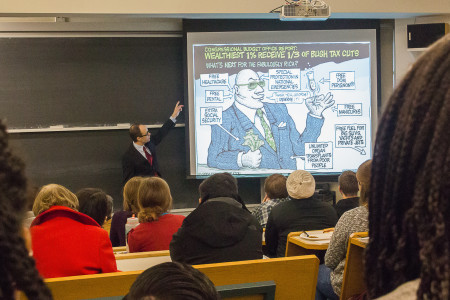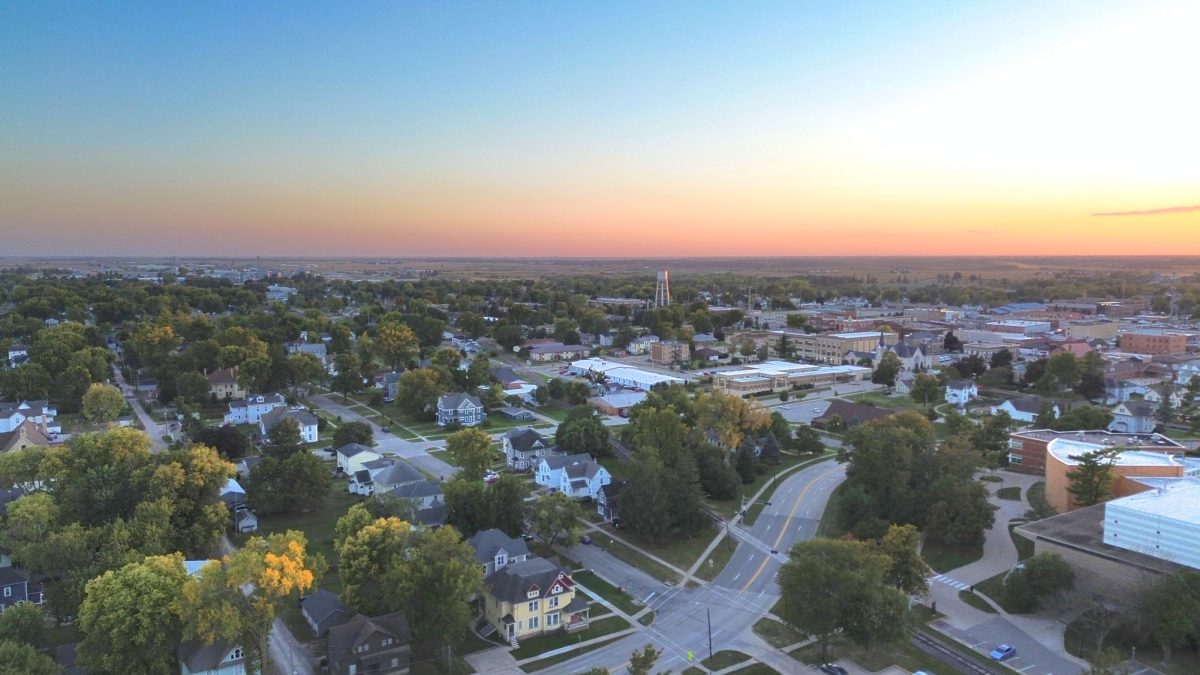Keli Vitaioli
vitaioli@grinnell.edu
Assistant Professor of Political Science at Syracuse University Spencer Piston ’01 presented his book project, “Why Americans Love the Welfare State,” on campus this past Monday, Feb. 15. Piston’s research examines American opinions on the welfare state and rejects the misconception that Americans hate welfare programs. He finds that in reality what they truly resent is the wealthy.
Presenting his own survey findings, Piston uncovered a new perspective in the discourse of Americans and welfare. While many sociologists believe Americans do not think about class groups, Piston argues that, in fact, they do, and it actually motivates much of their policy support.
“In social psychology research [we can see] sympathy for low status groups and resentment of high status groups is much more common than political scientists have typically recognized,” Piston said.
Piston’s survey investigates the role of social groups using the concept of deservingness.
“My [hypothesis] was that a group who is perceived to have less than it deserves becomes the object of sympathy, and a group perceived to have more than it deserves becomes the object of resentment,” Piston said. “[That] the American public believes the poor and the rich have exactly what they deserve. But what we see is predominant responses to say the rich have more than they deserve and the poor have less.”
The talk gave Lily Hamilton ’19 hope for future changes in policy proposals using Piston’s research and identifying the American trend towards wanting to help the poor.
“It made me feel relieved that he proved most Americans do support programs that decrease inequality,” Hamilton said. “It’s comforting to know many Americans value the humanity of those who are less fortunate than they are.”
Piston has found that the majority of people, both far leftists and conservative republicans, share Hamilton’s views. Overall, Americans do support welfare programs and have a general desire to help the less fortunate.
“We can’t explain today’s economically unequal outcomes just by saying, ‘This is how Americans want it,’” Piston said. “Because majorities of Americans don’t. They believe the poor have too little and the rich have too much.”
Piston referenced one of the sources of misperception of the attitude toward redistributive policies being “Why Americans Hate Welfare” by Martin Gilens and a further interpretation of Gilens’ study by Katherine Newman and Elizabeth Jacobs claiming the study proved that as the image of the poor “got blacker” public support for these policies dropped dramatically.
There is, in fact, a large percentage gap in Gilens’ findings between the percentage of Americans believing the government should increase welfare spending, which is about 12 percent, and the percentage believing the government should cut welfare spending, about 62 percent.
Yet, when the graph is expanded to include opinions on Medicaid, food for low income families and other downwardly redistributive economic policies, it becomes clear that welfare is the exception to the trend of high percentages in favor of increasing and not decreasing spending of American welfare programs.
Other researchers have explained why America has less support for these policies than other western democracies by accounting for American emphasis on small government, belief in hard work and a belief in unrealistic wealth accumulation or racial prejudice.
However, Piston’s research aims to explain the pattern of support for redistributive policies through something often overlooked — class attitudes.
“He is pushing back against political scientist literature that has ignored issues of class,” said Professor Katya Gibel-Mevorach, Anthropology. “The idea that people are automatically opposed to the poor, or low working class manual labor, that is not exactly true … He’s asking a different set of questions to tease out attitudes and not reproduce the same stereotypical attitudes that [are] current.”























































